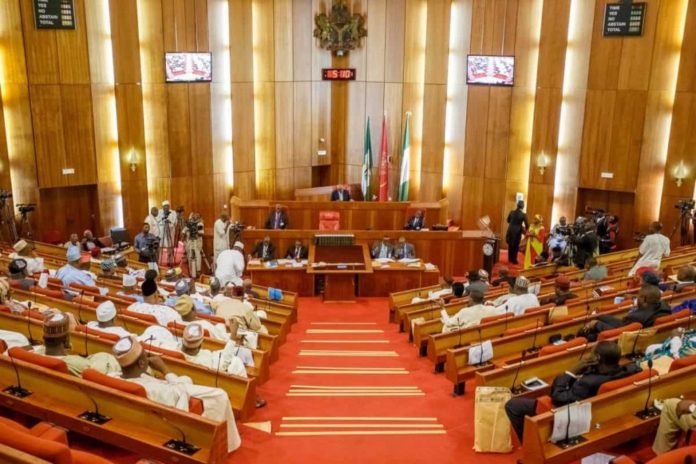The Senate, on Tuesday, passed, in its third and final reading, a bill aimed at enhancing the capacity of the Nigeria Deposit Insurance Corporation to protect depositors, ensure the stability of financial institutions, and promote trust in the banking system.
The legislation, titled Nigeria Deposit Insurance Corporation Act No 33 of 2023, was sponsored by Senator Adetokunbo Abiru (APC, Lagos East) and members of the Senate Committee on Banking, Insurance, and Other Financial Institutions.
Abiru presented the panel’s report at the plenary on Tuesday.
He stated that the bill would make the NDIC more effective, secure its independence and autonomy, and align it with current realities and best practices.
The bill consolidates the President’s power to appoint the Chairman and board members of the NDIC, while the Central Bank of Nigeria, which previously made recommendations for appointments, will now focus on supervising the corporation.
Under the new amendment, the NDIC will focus on the examination of banks.
Abiru noted that, although the NDIC 2023 Act significantly improved upon the 2006 Act, its implementation had been marked by ongoing debates.
He pointed out that stakeholders had consistently called for an amendment to the Act to address the issues raised.
He said, “The Nigeria Deposit Insurance Corporation (Amendment) Bill, 2024, is a critical piece of legislation aimed at strengthening Nigeria’s financial system.
“The proposed amendments will enhance the NDIC’s capacity to safeguard depositors, ensure financial stability, and foster trust in the banking system.
“Given the rapidly evolving financial sector, this Bill represents a timely response to emerging challenges and opportunities.”
Abiru added that the current Bill would put to rest any claims that the version assented to by former President Muhammadu Buhari materially differed from what was passed by the 9th National Assembly.
He said, “To further empower the corporation by guaranteeing its independence in performing its statutory functions in line with Section 1 (3) of the principal Act.”
“The Principal (2023) Act restricts the President’s power to appoint the Managing Director and Executive Directors, providing that they must be persons recommended by the Central Bank of Nigeria Governor.
“The (2024) bill seeks to amend this provision to align it with the President’s constitutional power of appointment, as enshrined in the 1999 Constitution (as amended).”
Abiru further stated, “The provision in the principal Act making the Permanent Secretary of the Ministry of Finance the Chairman of the Board is also being reviewed.
“This is due to the workload and busy schedule associated with that office, which makes such appointments untenable.
“The bill introduces a requirement for the Minister of Finance to establish an Interim Management Committee for the Corporation within 30 days following the expiration or termination of the Board’s tenure.
“This provision is to prevent challenges in the Corporation’s operations due to the absence of a board.”
Abiru highlighted the consensus among stakeholders on the importance of the NDIC in protecting depositors and ensuring the settlement of insured funds when a deposit-taking financial institution cannot repay deposits, thus supporting financial system stability.
He said, “Given the above, the consensus among stakeholders is that the legal framework must be reviewed.
“This will enable the Corporation to effectively fulfil its functions, safeguard its independence and autonomy, and align it with best practices.
“This is especially significant because the Corporation plays a vital role in
protecting depositors and fostering confidence in the financial sector.
“The challenges evolving in both the global and domestic banking environments make it essential to amend the current law to keep pace with these developments and ensure the NDIC remains fit for purpose.”
Abiru reported that over 30 written memoranda and numerous oral submissions were received, with all written memoranda and oral presentations at the hearing supporting the bill.
The Conclave





